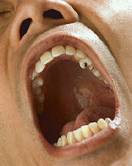
MONDAY, Nov. 19 (HealthDay News) — Among homeless children, obesity is associated with an increased risk of cavities, a new study indicates.
The findings provide further evidence of the link between the two conditions in children living below the poverty level, according to the researchers from Case Western Reserve University and the University of Akron, in Ohio.
For the study, the investigators looked at 157 children, aged 2 to 17 years, who were living in an urban homeless shelter. Most of the kids were from single-parent families headed by women, with one or two siblings.
The children’s obesity was calculated using body mass index (BMI), a measurement of body fat based on height and weight. The investigators included missing, filled or injured teeth in their cavity count. As BMI increased with age, so did the number of cavities, Marguerite DiMarco, an associate professor at the Frances Payne Bolton School of Nursing at Case Western Reserve University, and colleagues explained in a university news release.
The researchers said their findings support reports from the U.S. Centers for Disease Control and Prevention that obesity and poor oral health have doubled in the United States since 1980, increasing the risk of health problems such as diabetes, as well as self-esteem issues.
Poor families have difficulty getting dental care, but poverty also adds to dental health problems in other ways, such as making it difficult to obtain nutritious food and a lack of refrigeration to keep food fresh, DiMarco pointed out in the news release. Some homes even lack running water, she added.
“There are no easy solutions, especially with the homeless population,” DiMarco said.
The study was released online in advance of print publication in the Journal of Pediatric Health Care.
While the study found an association between obesity and poor dental health in homeless kids, it did not prove a cause-and-effect relationship.
More information
The Nemours Foundation explains how to keep your child’s teeth healthy.

